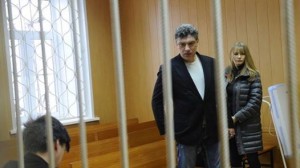Following the crackdown on a Russian protest at Manezhnaya Square earlier this week — a protest waged in solidarity with the convicted and sentenced defendants in the Bolotnaya Case and from which more than 400 people were detained by Russian OMON police — prominent oppositionists such as Alexei Navalny and Boris Nemtsov have been thrown in jail. This liveblog will chart developments throughout the day as to what’s happening to these dissidents in Moscow.
1953 GMT: More on the Kremlin’s punishment of the opposition.

New Times has interviewed some of the opposition protesters handed jail sentences this week for protest against the prison sentences of others in a demonstration last 6 May known as the Bolotnaya defendants. Here are some excerpts:
“Special Reception Center No. 2 in the Mnevniki District for persons sentenced to administrative arrests has just re-opened after capital reconstruction to receive some ‘politicals’. They are Alexey Navalny, Nadezhda Mityushkina, Boris Nemtsov, and Nikolai Lyaskin. Ilya Yashin was separated from them for some reason and sent to Special Reception Center No. 1 on Sevastopol Avenue, well known to him from several past jail terms.”
Says Navalny:
“This is a wonderful special reception center. For politicals, there are no limits on parcels. Here Nemtsov has given me a radio.
How do I regard [my] sentence in the Bolotnaya case? I regard it the same way as the Bolotnaya case itself — it is a fabricated and falsified case. Completely innocent peole got 3 to 4 years of prison colony. I think not a single nomral person could have any other attitude to that case and the sentence. These absolutely random people were taken hostage and now these hostages have been jailed to intimidate all the rest, and myself included.”
Nadezhda Mityushkin, member of the Federal Political Council of the Solidarity Movement, cell no. 6, was sentenced to 10 days of jail.
“I will get out of [jail] on 6 March at 19:45. I was detained in this way: I was standing with my back to Boris Nemtsov as he was giving an interview near the National Hotel. Col. Borodin approached Nemtsov and said something to him, then put him in a police van, and told me ‘Get inside.’ I got into the van. There were about 22 people in it. The van went to Tverskaya police precinct. Nemtsov was taken out and then in a few minutes we were told to get out. The van and the other detainees went to another police precinct. At Tverskaya, we met Alexei Navalny, Nikolai Lyaskin. At first all of them were fabricated Art. 20.2 (“failure to obey police officers”). And the police report was also under that article.
We were taken not to the assembly hall, as usual, but to the duty desk on the first floor and our lawyers were not allowed in for a long time — neither to see me, Nemtsov or Navalny. After awhile I was brought to the hall to be booked, and my lawyer began to look at the police and detention reports. After three hours, my lawyer demanded that I be released. Then they brought me documents that had already been filled out and brought witnesses with them, explaining this due to the fact that I wouldn’t sign any reports. My lawyers and I objected. But no one heeded us. In the report of my detention, it says I waved my hands, drew attention to myself, and shouted slogans. The police who signed my detention report in fact were detaining Nemtsov and had nothing to do with me, I was not even detained by anyone.”
1736 GMT: The U.S. State Department’s report on human rights in Russia:
The State Department has released its annual Country Reports on Human Rights Practices this week. By contrast with previous years of the Obama Administration when problems inside Russia or caused by Moscow tended to be downplayed, this year, in the report’s preface, Secretary of State John Kerry made very strong criticism of Moscow. He opened with a condemnation of Syria, “where the government has committed egregious human rights violations in an ongoing conflict that has claimed more than 100,000 lives, displaced millions, and created an opening for violent extremists that continues to endanger regional stability and our own national security.” Then Kerry led off the statements on specific countries with a denunciation of Russia among those countries “that continue to curb civil society and political opposition and target marginalized populations, including religious and ethnic minorities, and the LGBT community.”
This year’s report on Russia mentions the “foreign agents” law which has pressured NGOs critical of the government; the new law on gays; the Bolotnaya Square cases, Pussy Riot and other protesters; and the failure to bring the persons responsible for the death of Sergei Magnitsky to trial. Deaths in custody such as that of Vladimir Bulkov due to a guard’s beating, were also mentioned, and the ongoing suicides and homocides in the military due to brutal hazing practices were also highlighted.
The report also frankly addressed the situation in the North Caucasus, “where conflict among government forces, insurgents, Islamist militants, and criminal forces led to numerous human rights abuses, including killings, torture, physical abuse, and politically motivated abductions.
The State Department yearbook is strongest when it ferrets out the Russians’ own reports on rampant violations to deflect the Russian Foreign Ministry’s inevitable denials and efforts to find moral equivalency. For example, the report cites Chelyabinsk Oblast Human Rights Ombudsman Aleksey Sevastyanov who said suicide, harassment, and torture in prisons and detention centers increased 250 percent in his region over 2012 levels.
0435 GMT: Evgeny Vitishko, the environmentalist sentenced to 3 years of prison during the Sochi 2014 Winter Games, has been moved to the Tambov Region, his lawyer Marina Dubrovina reports.
According to the independent Caucasian Knot, Tishko’s conditional sentence of three years on charges of damaging a fence around the summer cottage of Krasnodar Governor Aleksandr Tkachev was changed to imprisonment after he allegedly failed to inform them of a trip out of town.
Dubrovina told the “Caucasian Knot” correspondent that the specific colony where Vitishko will serve his term is not yet known.
Photo by Leonid Martynyuk. Nemtsov with Irina Koreleva
Opposition member Boris Nemtsov has reported on his trial from his Facebook page. The Interpreter translates:
Miracles don’t happen in Putin’s courts. Moscow City Court has ruled to enforce the decision about my arrest. This is the first case in Russia when a regional deputy has been arrested without a special procedure. The United Russia members and Putinites should not gloat. They will be shut down this way as well. Not now, but soon.
Nemtsov was sentenced to 7 days of arrested on 25 February at a protest of the Bolotnaya sentences, and had appealed the decision.
The Interpreter’s own Elena Servettaz reports from the courthouse
1515 GMT Navalny barred from Internet, under house arrest:
Регистрация «Партии Прогресса» и домашний арест http://t.co/Wncofc0TMJ
— Alexey Navalny (@navalny) February 28, 2014
“It’s not very cheerful here at Moscow City Court…(We were yelled at for this photo.)
Opposition member Alexei Navalny has been sidelined for the next month. His last tweet:
Translation: @navalny Registration of Party of Progress and house arrest.
The good news is that his independent Party of Progress has now been registered as a “non-commercial organization” by the Russian Ministry of Justice as of 25 February, paving the way for participation in elections.
The bad news is that Navalny is now sentenced for his participation in a peaceful assembly on Manezh Square in Moscow to protest the verdicts in the Bolotnaya defendants’ cases. According to Alexei Navalny’s LiveJournal blog, which is now being run by his aides, the Basmanny Court of Moscow today changed its previous decision regarding his measures of restraint from a pledge not to leave town to house arrest until 28 April. He is also barred from use of the Internet.
According to Moscow News, Judge Artur Karpov — infamous for other politicized cases — ruled in response to an investigator complaint about Navalny allegedly violating bail terms in the case of an ongoing corruption probe into Yves Rocher.

